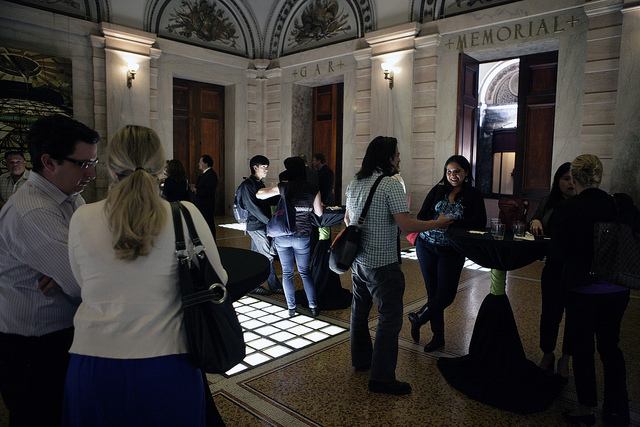
What might comprehensive immigration reform look like—around the country and in Chicago, a longtime city of immigrants—if Congress passes a bill that gives the 11 million undocumented people living in America a path to legality? At a Zócalo/Azteca America event at the Chicago Cultural Center, a panel of scholars of immigration and integration talked about the bill that’s currently on the table and the future of Chicago’s immigrant community.
ImmigrationWorks USA president Tamar Jacoby, who’s been working with lawmakers and organizations on the current immigration reform legislation, is optimistic about the process she’s seeing in Washington. A year ago, if someone said Democrats and Republicans would be collaborating on an immigration reform bill, “People would have just said, ‘What are you smoking?’” she said. What we’ve seen instead, she said, is a bipartisan group of senators who were still able to go into “that room, and they worked and worked, and they came out with what I think is a pretty balanced product.” They’ve balanced a humane solution for the undocumented with border enforcement, as well as the needs of families with the needs of America’s workforce.
Chicago Tribune urban affairs and immigration reporter Antonio Olivo, the evening’s moderator, asked immigration attorney Carlina Tapia-Ruano—who was involved in the 1986 amnesty that legalized 3 million people but also led to a flood of unauthorized immigration—what, if anything, we’ve learned.
Tapia-Ruano said that the senators this time around have done their homework and learned the major lesson of 1986: to look to the flow of future immigration and to increase the opportunity for legal migration while legalizing people who are already here.
But, asked Olivo, does the government have the capacity to process the 11 million people who want to get into the system?
“I would say yes, a resounding yes,” said Tapia-Ruano, pointing to the success of the Deferred Action for Childhood Arrivals (DACA) program, which has approved over 300,000 applications in less than a year.
Turning to University of Illinois at Chicago sociologist Xóchitl Bada, Olivo asked how the passage of the law might change the Chicago region.
“I believe the communities have been preparing for a very long time for this important moment,” said Bada. They’ve been fighting to fix a broken system while becoming civically engaged as best they can—taking citizenship lessons and English as a second language classes. At the same time, the state of Illinois has been a supportive place for immigrants thanks to the New Americans Initiative, a government-nonprofit partnership that provides free assistance to people seeking to become citizens.
Olivo asked Northwestern University political scientist Jaime Dominguez to speak to the possible effects of reform on Latino politics in Chicago.
Reform offers an opportunity for any group to engage fully within a larger community, said Dominguez. His hope is that it will lead organizations and elected officials to invest more in the Latino community—to reflect the city that Chicago has become. It’s no longer a black-white city, said Dominguez. It’s a tripartite city, and this is an opportunity for Chicago to take advantage of its diversity.
The Affordable Care Act remains a point of contention in Washington when it comes to this legislation; the cost of legalization is, said Jacoby, “the new stumbling block issue” for opponents of reform. Olivo asked her to discuss how healthcare costs affect the process of passing and implementing a bill.
Although low-earning people—immigrants and natives—use more in services than they pay, the net benefit of immigrants to the country far outweighs the costs, said Jacoby. She pointed to a North Carolina study that found that in a decade, immigrants cost the state $61 million in services—and made $11 billion in growth possible. “But it’s hard to educate the public about that,” she said.
Healthcare is “a very attractive red herring,” said Tapia-Ruano—especially because in the long run, it could cost people who are insured more money to keep immigrants uninsured and relying on emergency services.
It would be terrible, added Bada, to create two systems of workers—those who have access to healthcare and those who don’t.
Another concern about reform creating a two-tiered society revolves around the length of time it would take people to qualify for citizenship: 13 years. How might this play in Chicago?
“I think Chicago, or the state of Illinois in general, has a record of being progressive in integrating immigrants,” said Dominguez, pointing to the efforts of Mayors Richard Daley and Rahm Emanuel. If the government collaborates with nonprofits to undergird infrastructure at the state and local levels that get immigrants engaged—as it has in the past—you’re going to see success.
Olivo asked the panelists to talk about the effects of the proposed reform on the workforce. Why are we proposing giving jobs to people entering the country rather than people who are born here?
“Every country in the world now competes for smart people,” said Jacoby. They’re trying to educate the native-born to work in the science, technology, engineering, and math fields—and at the same time, they’re bringing in outsiders to fill those positions. Immigration isn’t about replacing but supplementing a country’s own people.
For every high-skilled immigrant there’s a low-skilled immigrant, added Dominguez. The Silicon Valley entrepreneur who comes here on a visa needs a nanny, needs someone to cut the grass.
Most Americans lie between these two poles, said Jacoby—we don’t have enough Ph.D.s, and we don’t have enough nannies and gardeners. “If we want to remain a nation of immigrants, it has to be legit so the public can get behind it,” she said. “If we want to keep our doors open, we have to find legal ways” for the people we need to take these jobs to come.
Ten percent of Mexicans live and work in the U.S., said Jacoby. American companies depend on immigrants from all over the world. And people are moving—as goods used to—all over the globe. This law is catching up with the reality in America, she concluded. And it’s good for everyone.






Send A Letter To the Editors